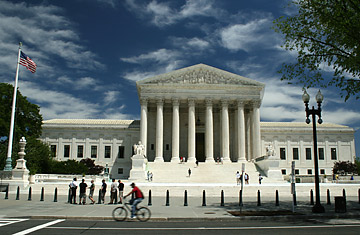
The U.S. Supreme Court Building, Washington D.C.
When the Supreme Court ended its term last week, its ruling extending gun rights was the big news. But the real headline of the term was the court's decision earlier this year giving corporations and unions sweeping new rights to spend money to elect candidates to office. It is not an overstatement to say that the 5 to 4 decision in Citizens United v. Federal Election Commission, which was handed down in January, could permanently change American democracy.
When the Citizens United case was working its way through the courts, it seemed like a limited dispute over the fine points of campaign-finance law. But the court blew it up into something larger, asking the parties to submit briefs reconsidering a doctrine that had been settled law for more than half a century: that corporations and labor unions are not allowed to spend money on federal elections.
The parties raced to finish their briefs last summer, and the court set the case down for oral argument before the term officially began in October — a highly unusual breakneck pace for Supreme Court litigation. By January, the court had struck down congressional limits on corporate and union spending on federal elections, ruling that they violate the First Amendment. Congress can no more stop corporations from speaking about elections, the five-member conservative majority said, than it could stop private individuals from speaking.
The new rule that the court laid down completely reshapes the political landscape. Until January this year, if companies such as ExxonMobil or Walmart wanted to throw their weight around in federal elections, they could encourage their employees to contribute their own money to a political-action committee, an indirect route that had inherent limits — notably the fact that there is only so much money employees are willing to give to fight their company's political battles.
Now, ExxonMobil or Walmart can simply go into the district of a member of Congress who is giving them a hard time and spend as much money as it wants to defeat him. The amount of money that is available is staggering. According to Democracy 21, a group that advocates for campaign-finance regulations, corporations had revenues of $13 trillion and profits of $605 billion during the last election cycle. (Unions have far less.)
Of course, corporations may not even have to spend the money. If a member of Congress knows that General Motors or ConAgra could spend millions of dollars to defeat him in the next election, he may be a lot more sympathetic to the company's request for a bailout or for favorable language in a pending bill. In his dissenting opinion in Citizens United, Justice John Paul Stevens argued, on behalf of four Justices, that the ruling "threatens to undermine the integrity of elected institutions across the nation." Days after the ruling came down, President Obama declared in his State of the Union address that the decision "reversed a century of law to open the floodgates for special interests."
Popular opinion has sided strongly with Justice Stevens and President Obama. An ABC/Washington Post poll found that 80% of Americans oppose the ruling, 65% of them "strongly." Although the Supreme Court was divided on ideological grounds, the general public apparently is not. Along with strong Democratic opposition, 76% of Republicans and 81% of independents believe the Citizens United ruling was wrong.
Congress is considering a bill to rein in Citizens United's impact. The Disclose Act would, among other things, require CEOs of companies that fund political ads to personally appear in those ads, saying they approve the message. That would not necessarily stop the special-interest spending, but it would make the spenders more accountable.
The act would also stop foreign-controlled corporations from spending on American elections. The Supreme Court's ruling seems to have left that door open, raising the possibility that foreign powers, even enemies of the U.S., operating through innocuous-sounding front groups, could have a sizable influence on U.S. elections.
The Disclose Act passed the House, although it picked up a controversial loophole along the way, which would exempt the National Rifle Association, the Sierra Club and some other large advocacy groups. Its prospects in the Senate — where it could face a filibuster — are uncertain. A few states, including New York, are considering passing legislation that would go further, requiring corporations to get approval from their shareholders before spending on elections.
As advocates on both sides fight over these bills, they have been making the same arguments that were made to the Supreme Court, and in the media, when the Citizens United ruling came down.
Critics of corporate spending on elections say it will give special interests more influence than ever over politics and elected officials, and it will further erode the public's faith in government. Supporters of corporate spending insist those fears are overblown. They argue that corporations are likely to be wary about abusing their new powers, and that in any case, more speech is a good thing.
As we head into the first congressional elections to be conducted under the new rules, one thing seems clear: we are about to start finding out which side is right.
